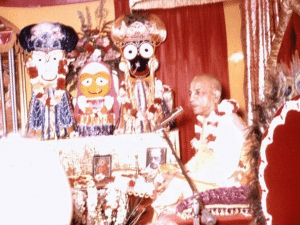No matter how they fumble, should find Krishna
Visakha Devi Dasi: In the fall of 1970—some 14 months after John and I had first met—my photography book was released: Photomacrography: Art and Techniques. An out-of-the-way gallery in Manhattan held a one-person show of my original illustrations, and I impatiently waited for permission from Cuban government officials for John and me to photograph in Cuba—the next project I'd dreamed up. John, meanwhile, flew to Bombay in December 1970 to begin his master’s thesis on the Hare Krishna devotees—a small group of them had accompanied their elderly leader, A. C. Bhaktivedanta Swami Prabhupada, to India. (John had considered doing his thesis on Zen Buddhism, but practitioners in Buffalo, New York, were observing a day of silence when he arrived and couldn't discuss the idea with him; the devotees though, were immediately enthusiastic about his project and loved his photographs).
Left behind in the States, that old emptiness in me got louder, those lingering questions of: "What exactly is my purpose? How would my doings help me or anyone else? And for that matter, what did it mean to help myself and others? What is life all about, anyway?" In the deepest part of me there was something hollow, something that decidedly needed filling. But the questions were a whisper and I had no idea of who could give me answers. Anyway, everyone around me was astonished by my early success.
Why ask existential questions?
John’s letters from India started coming, one after another. In the first, he wrote,
I spoke with Prabhupada this morning. He asked me if I was enjoying being with them and what I had learned... He said that some of his devotees who wear the robes and seem like devotees are not, actually, because they have not given up attachments. I have seen that too much in living with the devotees. They hardly measure up to the way a true devotee should act in some cases.
This resonated with me. From what I'd occasionally heard from my mother, who was consistently suspicious of people's motives, and from what I'd read from time to time, it was considerably easier to wear religious clothes and speak pious words than to focus one's thoughts and heart on divinity. History and the daily newspaper was replete with "pious" people who had acted impiously, who used religion as a tool to exploit others, who did harm in the name of God.
John's letter continued,
Prabhupada recognizes this. He really is compassionate and understanding. His only idea is that people, no matter how they fumble, should find Krishna. He doesn't let petty things bother him. I went with him on his walk yesterday and had trouble keeping up. He is 74!
